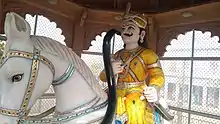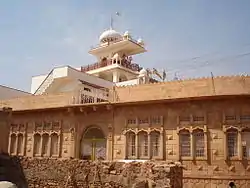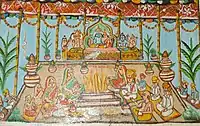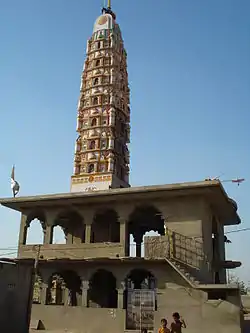Veer Teja
Veer Teja or Tejaji is a Rajasthani folk deity. He is considered one of the major eleven incarnations of Shiva and worshipped as a deity in rural Rajasthan.[1][2]
| Veer Teja | |
|---|---|
 Tejaji riding a horse | |
| Affiliation | Deva, Avatar of Shiva |
| Personal information | |
| Born | 1074 |
| Died | 1103 |
| Parents |
|
Veer Teja was born around 1074 in Khadnal, Rajasthan, India. His parents, Ramkunwari and Tahar, were Dhaulya Jats.[3]
Legend has it that Teja died in 1103 from wounds received in battle while trying to rescue a herd of cows that had been dispersed during a raid by Mer people. The story says that while dying he allowed a snake to bite his tongue, that being the only unwounded area of his body. In return, the snake promised that no person or animal would die from a snakebite if they sought the blessings of Teja.[3]
Rural people in Rajasthan particularly call upon this promise on Shukla tenth of the month of Bhadrapada, a day that is set aside for marking his death.[3]
Anthropologists say the Tejaji cult is a protagonist that includes an element of protest against the caste system.[4]

 Painting depicting Tejaji's marriage at Pushkar
Painting depicting Tejaji's marriage at Pushkar
See Also
Commemoration
In September 2011, India Post released a commemorative stamp depicting Tejaji.[5]
A Rajasthani language movie titled Veer Tejaji, based on the life of Tejaji was made in the 1980s.
References
- Editorial, Reuters. "In India, getting bitten by a snake seen as good luck". U.S. Retrieved 16 October 2018.
- ANI (16 September 2016). "Rajasthan celebrates unique snake festival to bring good fortune". India.com. Retrieved 16 October 2018.
- Hooja, Rima (2006). A History of Rajasthan. Rupa Publications. p. 428. ISBN 978-8129108906. Retrieved 16 February 2019.
- Dhali, Rajshree Popular Religion in Rajasthan: A Study of Four Deities and Their Worship in Nineteenth and Twentieth Century, 2014, p. 229
- Rajasthan Voice: Thursday, September 8, 2011, Special postage stamp released on Folk deity Veer Teja
Further reading
- Madan Meena: Tejaji Gatha (Hadoti & Hindi), Kota Heritage Society, Kota, 2012 ISBN 978-81-8465-686-2 (Published under the World Oral Literature Project, University of Cambridge, UK)